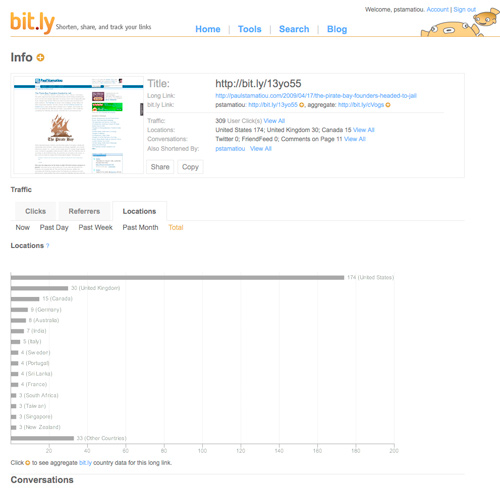The other day I was talking with local entrepreneur Sanjay Parekh about a domain I had recently purchased. He commented on how it was rather short and could be also be used as a URL shortening service. That triggered a few responses on my end: 1) I feel that URL shortening services are very much a crowded "me too" space and 2) relatively few URL shorteners provide real benefits other than their primary utility.
URL Shorteners 101
By my count, there are somewhere between 90 to 100 URL shorteners that are even remotely used. There's no doubt in my mind that at least 500 URL shorteners/redirection services exist in some working form online. We all know the premise behind them; you have a long, nasty URL that you need to share with someone either in some limited space, more recently Twitter, but originally from old email clients that hard wrapped lines and broke links in emails.
Thoughts
First off, my title for this post employs a bit of sensationalism. I'm not entirely opposed to URL shorteners, I just know they have a time and a place. I don't like all of the blatant me too URL shortening services that offer no value-proposition over its competitors, other than just a really short URL.
Second, as Joshua Schachter seemed to focus on last week, URL shorteners add a delay to the end-user who clicks on them, with an extra DNS lookup. However, chances are all these common domains are already cached by the user, but the real issue for me is the uncertain lifetime of shortened URLs. I don't feel this is a huge deal if shortened URLs are used properly. In the case of Twitter, how often do people read your tweets from last year and does it really matter if that link is dead? However, this is a big issue when shortened URLs are used in the 'wrong' types of situations - such as saved to your delicious or tumblr account, or posted on your blog - places that make it easier to find and follow URLs than Twitter. And when that happens search engines will start indexing those types of shortened URLs (bad URL shorteners use a temporary 302 redirect, causing search engines to place value on the shortened URL, ugh!); and that's a problem when the URL shortener stops working.
Third, I like URL shorteners that do something in addition to shortening my URLs by 40 characters or what have you. Bit.ly is one of these services. At first I was jokingly shocked to find that a 6-character-long URL shortener received venture funding, when there are several 5-character-long URL shorteners online. Then I actually checked out bit.ly. They're doing some impressive stuff including keeping detailed URL statistics in addition to making it easy to share shortened URLs and aggregate conversations around such URLs.
 Example stats page of a bit.ly shortened URL
Example stats page of a bit.ly shortened URL
Unfortunately, many Twitter clients do not yet utilize the bit.ly API so you lose the stat tracking, but I digress.
In a more perfect world, two things could be different:
-
Twitter would have a separate area for links of any length, that do not count as part of the 140 character limitation, similar to how the late Pownce.com handled URLs.
-
Sites would have their own URL shortening services. I actually had my own URL shortener on this website back in 2006 after hearing about Shorty on Derek Punsalan's blog and now I see Derek is using another method of shortening his URLs. As he points out, you get to maintain your own personal brand by having the shortened URLs come from your site, without risking anything.
Verdict: URL shorteners are a necessary evil. I only shorten URLs for Twitter and will only use a modern service that uses 301 redirects and does not have a middle-man interstitial advertisement or ad/iframe-bar, all the while providing me with some bells and whistles. For now, that is bit.ly.
Do you think URL shorteners are laying the groundwork for a future Web filled with dead links? What URL shortening service do you use? What do you use it for?